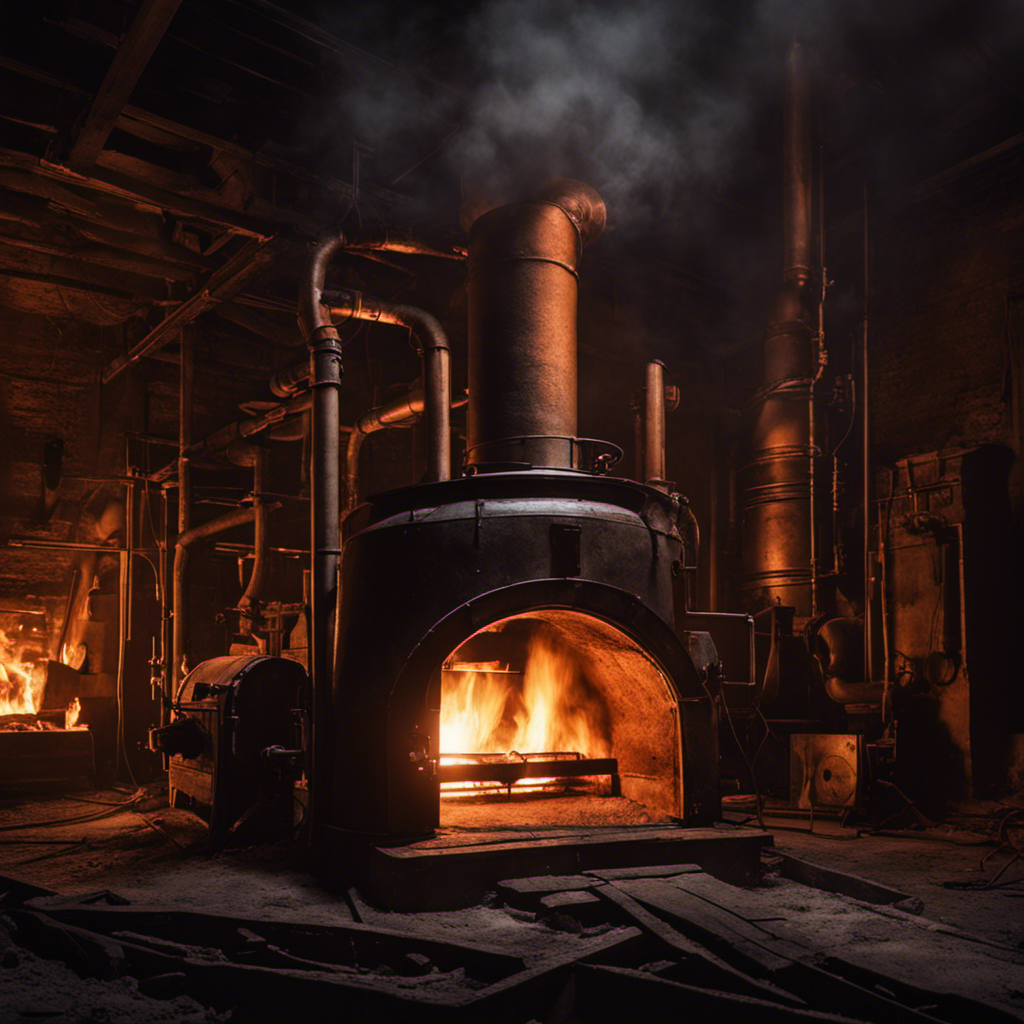In this article, we will explore the various sounds that may indicate a furnace is reaching the end of its lifespan. Recognizing these sounds is crucial for homeowners seeking to provide optimal comfort and safety to their families.
By understanding the distinct rattling, banging, screeching, squealing, clicking, clanking, whistling, whirring, popping, pinging, and grinding noises, individuals can take timely action to prevent potential breakdowns and costly repairs.
Stay informed and protect your home by familiarizing yourself with the audible signs of a dying furnace.
Key Takeaways
- Loose or damaged components within the furnace can cause rattling or banging sounds.
- Screeching or squealing sounds from a dying furnace can be caused by a worn-out belt or faulty blower motor.
- Clicking and clanking sounds indicate underlying mechanical issues in the furnace, such as loose or broken components.
- Whistling noises in a dying furnace can be caused by restricted airflow, while whirring sounds may indicate a faulty fan motor.
Rattling and Banging Noises
Rattling and banging noises in a furnace can be indicative of several common problems that can arise as a furnace ages and deteriorates.
One possible cause of these noises is loose or damaged components within the furnace. Over time, the constant heating and cooling cycles can cause parts to become loose or worn out, leading to the rattling or banging sounds.
Another possible cause is a faulty blower motor or fan. If the blower motor is not functioning properly, it can create vibrations and cause the furnace to make loud noises.
Troubleshooting these common furnace problems requires the expertise of a professional technician who can diagnose and repair the issue, ensuring the comfort and safety of those being served.
Screeching and Squealing Sounds
Many homeowners may have experienced the unpleasant occurrence of screeching or squealing sounds coming from their dying furnace. These noises can be quite alarming, leading to concerns about the safety and functionality of the heating system. However, it is important to understand the causes and solutions to these sounds in order to address the issue effectively.
One common misconception is that screeching or squealing sounds indicate a major problem with the furnace. While it is true that these noises can be indicative of certain issues, such as a worn-out belt or a faulty blower motor, they do not necessarily mean that the entire furnace is on the verge of breaking down.
In many cases, the screeching or squealing sounds can be resolved by simple maintenance tasks. For instance, lubricating the moving parts of the furnace, such as the blower motor or fan, can help eliminate these noises. Additionally, replacing a worn-out or damaged belt can also solve the problem.
To ensure the safety and efficiency of the furnace, it is crucial to have it inspected by a professional technician. They can accurately diagnose the cause of the screeching or squealing sounds and provide appropriate solutions. Regular maintenance and prompt repairs are key to preventing further damage and ensuring the longevity of the furnace.
Clicking and Clanking Sounds
Clicking and clanking sounds emanating from a furnace can indicate underlying mechanical issues that require attention and repair. These sounds are often a sign of trouble within the furnace system, and it is important to address them promptly to prevent further damage.
When troubleshooting common furnace problems, it is essential to listen for these clicking and clanking sounds as they can indicate various issues. One possible cause of these sounds is a loose or broken component, such as a fan blade or motor. Another potential issue could be a worn-out belt or bearings. Additionally, a buildup of debris or a faulty ignition system can also result in clicking and clanking noises.
If you hear these sounds, it is a clear sign that furnace maintenance is needed to ensure its proper functioning and to avoid a complete breakdown.
Whistling and Whirring Noises
A dying furnace may emit whistling or whirring noises, indicating potential issues with its airflow or fan motor.
Whistling noises in a dying furnace can be caused by restricted airflow due to a clogged air filter, ductwork obstructions, or closed vents. To address this, the air filter should be checked and replaced if necessary. Ductwork should also be inspected for any obstructions and vents should be opened to ensure proper airflow.
Whirring sounds in a failing furnace may be attributed to a faulty fan motor. Troubleshooting and fixing this issue involves checking the fan blades for any debris and ensuring they are securely attached. If the problem persists, it is recommended to consult a professional technician to diagnose and repair the failing furnace.
Popping and Pinging Sounds
Several distinct popping and pinging sounds may indicate a dying furnace, pointing to potential issues with the heat exchanger or ignition system. These sounds can be alarming, but understanding their potential causes and troubleshooting tips can help homeowners address the problem promptly.
One potential cause of popping and pinging sounds is a cracked heat exchanger. This can occur due to age, wear and tear, or poor maintenance.
Another possible cause is an issue with the ignition system, such as a faulty igniter or a gas valve problem.
Troubleshooting tips include checking for any visible cracks or damage in the heat exchanger, as well as inspecting the ignition system for any signs of malfunction.
It is important to contact a professional HVAC technician to diagnose and repair these issues to ensure the safety and efficiency of the furnace.
Grinding and Grinding Noises
Excessive grinding and grinding noises emanating from a furnace can be indicative of severe mechanical issues that require immediate attention from a professional HVAC technician. Troubleshooting common furnace grinding noises is essential to diagnose and resolve the problem.
One common cause of grinding noises is a failing furnace motor. Signs of a failing furnace motor include a persistent grinding sound, decreased airflow, and increased energy consumption. To fix this issue, it is crucial to replace the faulty motor promptly. A professional HVAC technician can properly diagnose the problem and provide the necessary repairs or replacements.
Regular maintenance and inspections can help prevent such issues and ensure the smooth operation of the furnace, extending its lifespan and maximizing its efficiency.
Frequently Asked Questions
How Much Does It Cost to Repair a Furnace Making Rattling and Banging Noises?
The cost of furnace repair for rattling and banging noises can vary depending on the specific issue. Common furnace noises can be caused by loose parts or a failing motor. It is recommended to contact a professional technician for an accurate diagnosis and cost estimate.
Can Screeching and Squealing Sounds From a Furnace Indicate a Serious Problem?
Screeching and squealing sounds from a furnace can indicate a serious problem. These noises are commonly caused by issues such as a worn-out blower motor or a loose belt. Troubleshooting common furnace sounds is essential to ensure proper functioning and prevent further damage.
What Could Be Causing Clicking and Clanking Sounds in My Furnace?
The clicking and clanking sounds in a furnace can be caused by a variety of issues, such as loose components, worn bearings, or a faulty blower motor. Troubleshooting furnace noises is essential to ensure optimal performance and prevent further damage.
Is It Normal for a Furnace to Make Whistling and Whirring Noises?
It is not normal for a furnace to make whistling and whirring noises. These sounds could indicate issues such as blocked air vents, dirty filters, or problems with the blower motor. Troubleshooting these causes is recommended.
How Can I Prevent Popping and Pinging Sounds in My Furnace?
To prevent furnace popping and troubleshoot furnace pinging, regular maintenance is crucial. Cleaning or replacing dirty air filters, checking and adjusting the gas pressure, and ensuring proper ventilation can help prevent these sounds and ensure the furnace operates efficiently.


